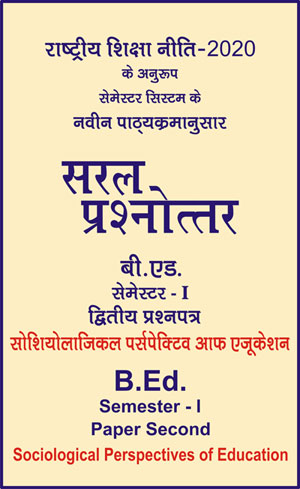|
बी एड - एम एड >> बी.एड. सेमेस्टर-1 प्रश्नपत्र-II - सोशियोलाजिकल पर्सपेक्टिव आफ एजूकेशन बी.एड. सेमेस्टर-1 प्रश्नपत्र-II - सोशियोलाजिकल पर्सपेक्टिव आफ एजूकेशनसरल प्रश्नोत्तर समूह
|
|
|||||||
बी.एड. सेमेस्टर-1 प्रश्नपत्र-II - सोशियोलाजिकल पर्सपेक्टिव आफ एजूकेशन (अंग्रेजी भाषा मे)
Question- Discuss the efforts made for eradication of untouchability.
Ans.
Efforts made for Eradication of Untouchability - Both governmental as well as non-governmental efforts are made to eradicate untouchability in India. Efforts can be summed up in following heads -
1. Governmental Efforts to Eradicate Untouchability - These can be enumerated as below -
(a) Legislative Measures for the Removal of Untouchability -
Article 17 declares the practice of untouchability is a serious and punishable offence. The parliament passed the untouchability offence Act in 1955 which was later substituted by Protection of Civil Rights Act, 1976. Following offences are considered punishable under the Act of Untouchability -
(i) Committing any kind of social injustice, such as denying access to any shop, restaurant, public hospital, educational institution or any place of public entertainment.
(ii) Preventing a person on the grounds of untouchability from entering a place of worship and offering prayers or from drinking water from well or spring.
(iii) Refusal to sell goods or sender services to a person on the grounds of untouchability is an offence punishable with imprisonment for 6 months or a fine upto ₹ 500 or both.
(b) Constitutional Safeguards - The Indian Constitution provides protector and safeguards for the untouchables by the way of general rights of citizenship. Indian constitution makes the following provisions to eradicate untouchability -
(i) Article 15(1) states the state(s) will not discriminate any citizen on the grounds of religion, race, caste, sex, place of birth etc.
(ii) Article 16(2) states that there shall be equality of opportunity for all citizens in matter relating to employment or appointment to any office under the state.
(iii) Article 46 provides that state shall promote with special care the educational and economic interests of the weaker sections of the people and in particular of the scheduled castes and tribes and shall protect them.
2. Non-governmental Efforts - In India, there are several non-governmental bodies who took strain and pain in eradicating untouchability. Noteworthy institutions like Harijen Sevak Singh, Scheduled Caste Federation etc, as well as noteworthy persons, like M.K. Gandhi, Dr. B.R. Ambedkar, Swami Vivekanand, Raja Rammohan Roy etc were many few people who lend-hand in abolishing the sinister act of untouchability.
|
|||||

 i
i 










